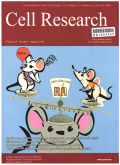- 钛学术文献服务平台 \
- 学术期刊 \
- 基础科学期刊 \
- 生物科学期刊 \
- 细胞研究(英文版)期刊 \
Cancer epigenetics:linking basic biology to clinical medicine
Cancer epigenetics:linking basic biology to clinical medicine
基本信息来源于合作网站,原文需代理用户跳转至来源网站获取
摘要:
Cancer evolution at all stages is driven by both epigenetic abnormalities as well as genetic alterations.Dysregulation of epigenetic control events may lead to abnormal patterns of DNA methylation and chromatin configurations, both of which are critical contributors to the pathogenesis of cancer. These epigenetic abnormalities are set and maintained by multiple protein complexes and the interplay between their individual components including DNA methylation machinery, histone modifiers, particularly, polycomb(PcG)proteins, and chromatin remodeling proteins. Recent advances in genome-wide technology have revealed that the involvement of these dysregulated epigenetic components appears to be extensive. Moreover, there is a growing connection between epigenetic abnormalities in cancer and concepts concerning stem-like cell subpopulations as a driving force for cancer. Emerging data suggest that aspects of the epigenetic landscape inherent to normal embryonic and adult stem/progenitor cells may help foster, under the stress of chronic inflammation or accumulating reactive oxygen species,evolution of malignant subpopulations. Finally, understanding molecular mechanisms involved in initiation and maintenance of epigenetic abnormalities in all types of cancer has great potential for translational purposes. This is already evident for epigenetic biomarker development, and for pharmacological targeting aimed at reversing cancerspecific epigenetic alterations.

推荐文章
SATⅡBiology:对细胞呼吸内容的解析
有氧呼吸
糖酵解
克雷布斯循环
电子传递链和化学渗透作用
无氧呼吸
Visual Basic语言数组概念解析
Visual Basic
数组
静态
动态
内容分析
关键词云
关键词热度
相关文献总数
(/次)
(/年)
引文网络
引文网络
二级参考文献 (0)
共引文献 (0)
参考文献 (146)
节点文献
引证文献 (0)
同被引文献 (0)
二级引证文献 (0)
1971(1)
- 参考文献(1)
- 二级参考文献(0)
1978(1)
- 参考文献(1)
- 二级参考文献(0)
1980(2)
- 参考文献(2)
- 二级参考文献(0)
1981(1)
- 参考文献(1)
- 二级参考文献(0)
1982(1)
- 参考文献(1)
- 二级参考文献(0)
1983(1)
- 参考文献(1)
- 二级参考文献(0)
1984(1)
- 参考文献(1)
- 二级参考文献(0)
1985(1)
- 参考文献(1)
- 二级参考文献(0)
1986(1)
- 参考文献(1)
- 二级参考文献(0)
1987(1)
- 参考文献(1)
- 二级参考文献(0)
1990(1)
- 参考文献(1)
- 二级参考文献(0)
1994(4)
- 参考文献(4)
- 二级参考文献(0)
1995(2)
- 参考文献(2)
- 二级参考文献(0)
1996(1)
- 参考文献(1)
- 二级参考文献(0)
1997(2)
- 参考文献(2)
- 二级参考文献(0)
1998(7)
- 参考文献(7)
- 二级参考文献(0)
1999(11)
- 参考文献(11)
- 二级参考文献(0)
2000(11)
- 参考文献(11)
- 二级参考文献(0)
2001(4)
- 参考文献(4)
- 二级参考文献(0)
2002(7)
- 参考文献(7)
- 二级参考文献(0)
2003(3)
- 参考文献(3)
- 二级参考文献(0)
2004(5)
- 参考文献(5)
- 二级参考文献(0)
2005(5)
- 参考文献(5)
- 二级参考文献(0)
2006(15)
- 参考文献(15)
- 二级参考文献(0)
2007(12)
- 参考文献(12)
- 二级参考文献(0)
2008(14)
- 参考文献(14)
- 二级参考文献(0)
2009(16)
- 参考文献(16)
- 二级参考文献(0)
2010(15)
- 参考文献(15)
- 二级参考文献(0)
2011(0)
- 参考文献(0)
- 二级参考文献(0)
- 引证文献(0)
- 二级引证文献(0)
引文网络交叉学科
相关学者/机构
期刊影响力
细胞研究(英文版)
主办单位:
中国科学院上海生化细胞所
出版周期:
月刊
ISSN:
1001-0602
CN:
31-1568/Q
开本:
16开
出版地:
上海岳阳路319号中科院上海生命科学研究院31B,401室
邮发代号:
4-645
创刊时间:
1990
语种:
eng
出版文献量(篇)
2692
总下载数(次)
0
总被引数(次)
40708
期刊文献
相关文献
推荐文献
- 期刊分类
- 期刊(年)
- 期刊(期)
- 期刊推荐
力学
化学
地球物理学
地质学
基础科学综合
大学学报
天文学
天文学、地球科学
数学
气象学
海洋学
物理学
生物学
生物科学
自然地理学和测绘学
自然科学总论
自然科学理论与方法
资源科学
非线性科学与系统科学
细胞研究(英文版)2022
细胞研究(英文版)2021
细胞研究(英文版)2020
细胞研究(英文版)2019
细胞研究(英文版)2018
细胞研究(英文版)2017
细胞研究(英文版)2016
细胞研究(英文版)2015
细胞研究(英文版)2014
细胞研究(英文版)2013
细胞研究(英文版)2012
细胞研究(英文版)2011
细胞研究(英文版)2010
细胞研究(英文版)2009
细胞研究(英文版)2008
细胞研究(英文版)2007
细胞研究(英文版)2006
细胞研究(英文版)2005
细胞研究(英文版)2004
细胞研究(英文版)2003
细胞研究(英文版)2002
细胞研究(英文版)2001
细胞研究(英文版)2000
细胞研究(英文版)2011年第9期
细胞研究(英文版)2011年第8期
细胞研究(英文版)2011年第7期
细胞研究(英文版)2011年第6期
细胞研究(英文版)2011年第5期
细胞研究(英文版)2011年第4期
细胞研究(英文版)2011年第3期
细胞研究(英文版)2011年第2期
细胞研究(英文版)2011年第12期
细胞研究(英文版)2011年第11期
细胞研究(英文版)2011年第10期
细胞研究(英文版)2011年第1期

 免费查重
免费查重










